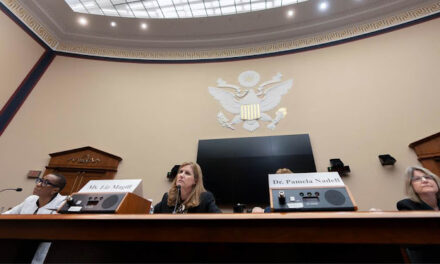LTP News Sharing:
By
Ira Stoll |
The Wall Street Journal
On inflation, immigration and transgenderism, progressive philanthropies took the party to places voters didn’t want to go.
To the list of those to blame for the Democrats’ loss, add some of America’s largest philanthropic foundations.
On three big issues of the presidential campaign—inflation, immigration and transgenderism—charitable foundations and their grantees supported policies that wound up damaging the Democrats. The culprits include the $25 billion Open Society Foundations, the $16 billion Ford Foundation, and the $12.8 billion William and Flora Hewlett Foundation.
On inflation, a 2020 Hewlett Foundation Economy and Society Initiative memo urged governments to “spend on efforts that boost aggregate demand without worrying about inflation quite so frantically.” Foundation executive Jennifer Harris, who helped launch the initiative, went to work in the Biden White House. She served from 2021-23 as a special assistant to the president and senior director on the National Security Council and National Economic Council. When she rejoined Hewlett, the foundation credited her with having been “a key contributor” to the Biden administration’s economic policy. A June 2024 piece in the New York Times called her “The Queen Bee of Bidenomics” while noting that her ideas “haven’t yet taken hold in the broader electorate.”
Another idea that hasn’t “yet” taken hold is that unlimited numbers of asylum seekers and refugees should be admitted to the U.S. and housed indefinitely at taxpayer expense in urban hotels. Many legal immigrants and their descendants think the Biden border policies have been a disaster. Who is responsible? The International Refugee Assistance Project took the credit, so it certainly deserves some of the blame. “We are proud that many of our recommendations and advocacy priorities have been incorporated into the Biden Administration’s agenda,” the group boasted in its 2021 annual report.
The International Refugee Assistance Project’s backers include the Open Society Foundations and the Ford Foundation. Ford also backs an umbrella group called Grantmakers Concerned With Immigrants and Refugees, whose activities include an Undocumented in Philanthropy Network, aiming to “increase the representation of current and formerly undocumented professionals throughout the philanthropic sector.”
A survey of swing voters by Blueprint, a Democratic research initiative, found that along with inflation and immigration, Kamala Harris’s focus on “cultural issues like transgender issues” was a top reason for choosing Donald Trump. Ms. Harris should blame the American Civil Liberties Union for setting her up to lose. On a 2019 candidate questionnaire, the advocacy organization badgered her into favoring taxpayer-funded sex-change surgeries for detained illegal immigrants. Voters punished her for it five years later.
The ACLU has some features of a grassroots organization but since 2001 it’s been led by former Ford Foundation executive Anthony Romero. The ACLU takes in millions from foundations such as Ford and Hewlett, both members of Grantmakers United for Trans Communities and signers of a pledge to “increase our grantmaking for trans communities.”
No doubt, immigration, inflation and improving medical care for prisoners and detainees are issues on which private philanthropy can play a constructive role. Yet vast endowments have a way of insulating foundation executives and board members from political reality. Politicians running in contested elections don’t have that luxury.
Next time around, policymakers may want to think twice before borrowing ideas from the foundation world. And contemporary tycoons tempted to establish organizations aimed at influencing policy might consider whether they’d be better off giving their fortunes away themselves, in their own lifetimes.
Author: Frances Rice






